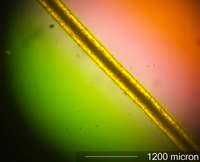Textile Polymer Laboratory
Head of Laboratory: Diana Cayuela Marín
Phone number: +34 93 739 82 78
Laboratory phone number: +34 93 739 82 78
Services

The equipment of the textile polymer laboratory allows the determination of the structure and microstructure of natural and synthetic polymers characteristics.
- Cellulosic fibres: Degree of polymerization. Detection of oxycelluloses and hydro celluloses. Reduction capacity. Water imbibition. Acetyl groups.
- Wool: Acid or alkali content and ph of the aqueous extract. Extraction with dichloromethane and degreasing control. Alkaline solubility and urea-bisulphite solubility. Content of cystine, cysteine, cystic acid and tryptophan.
- Synthetic polymers: Molecular weight by GPC chromatography. Melting and glass transition temperatures by Differential Scanning Calorimetry (DSC). Effective heat setting temperature. Specific heat at constant pressure and enthalpies of fusion and crystallization. Crystallinity percentage (Differential Scanning Calorimetry and densities). Terminal groups in polyamides and polyesters. Characterization of the fine structure in polyester, polyamide and acrylic fibres and its relationship with dyeing behaviour.
- Qualitative and quantitative analysis fibres and its mixtures.
Equipment
- Differential Scanning Calorimetry (DSC).
- Differential Scanning Calorimetry (DSC).
- Centrifuge
- Density gradient columne
- Gel permeation chromatography (GPC)
- Infrared spectrophotometer (FTIR)
- Extruder
- Optical microscope with polarized light
- Hot plate press
- Balances, stoves and laboratory material in general
Courses
M1: Classification and properties of textile fibres
M4: Aspects and properties of fibres
Lines R+D
- Textile polymers and raw materials
- Development of chemical textile processes
- Textile nanomaterials and nanotechnologies
Share: